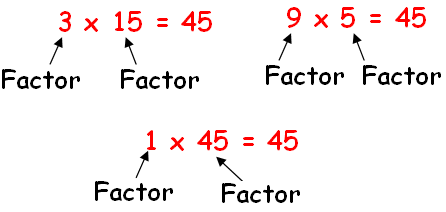FACTORS AND MULTIPLES
Subscribe to our ▶️ YouTube channel 🔴 for the latest videos, updates, and tips.
Factors are numbers we can multiply together to get a number.
A multiple is the product of a number and any whole number except zero.
To find the factors of a number, we can follow the below steps
Step 1 :
Use multiplication or division facts to find factors. Start with 1 x the given number. Every counting number has at least two factor 1 and the number itself. So, 1 and 8 are factors of 8.
Step 2 :
Test other factor pairs. The only possible whole number factors of 8 are numbers from 1 to 8.
Step 3 :
Continue until the factors repeat
Note :
A factor always divides the product without a remainder.
Example 1 :
Find the factors of 45.
Solution :

Factors of 45 are 1, 3, 5, 9, 15, 45.
Example 2 :
18, 24 and 30 are all multiples of three.
A) True B) False
Solution :
To check if the given numbers 18, 24 and 30 are multiples of 3 or not, we can use the divisibility rule for 3 or try to write each as product of 3.
Divisibility rule for 3 :
18 = 1 + 8 ==> 9/3 (9 is divisible by 3)
24 = 2 + 4 ==> 6/3 (6 is divisible by 3)
30 = 3 + 0 ==> 3/3 (3 is divisible by 3)
Writing it as factors of 3 :
18 = 3 x 6
24 = 3 x 8
30 = 3 x 10
So, 18, 24 and 30 are factors of 3.
Example 3 :
5 is a multiple of 20
A) True B) False
Solution :
If we are able to write 20 as product of 5, then we decide 20 is multiple of 5.
20 = 2 x 10
20 = 4 x 5
20 is a multiple of 5.
Example 4 :
Which list is made up of multiples of 4?
A) 1, 4, 40 B) 8, 16, 36 C) 12, 22, 28 D) 4, 14, 24
Solution :
Option A :
1, 4, 40
1 is a not a multiple of 4. 4 is the first multiple of 4.
Then, let us choose option D.
Option D :
4, 14, 24
Here 4 is a multiple of 4 but 14 is not a multiple of 4. So, option D is incorrect.
Option B :
8, 16, 36
8 = 2 x 4
16 = 4 x 4
36 = 4 x 9
So, option B is correct.
Example 5 :
The multiples of 5 all end in 0 or 5.
A) True B) False
Solution :
A number which ends with 0 or 5 will be divisible by 5. Then it is true.
Example 6 :
Six has all the following factors...
A) 1, 2, 3, 6 B) 3, 6, 12, 18 C) 2, 4, 6
Solution :
Factors of 6 are,
1, 2, 3 and 6. Then option A is correct.
Example 7 :
Five has only two factors.
A) True B) False
Solution :
5 is a prime number, every prime number is divisible by 1 and itself. Then it is true.
Example 8 :
The factors of 24 include...
A) 1, 6, 9 B) 1, 8, 12 C) 1, 5, 12 D) 15, 30, 48
Solution :
Factors of 24 are,
1, 2, 3, 4, 6, 8, 12, 24
So, option B is correct.
Number of Factors of a Number
If the given number is small, it is easy to find number of factors. But, for larger numbers, we can't just count one by one. This is a nice trick to find how many factors are in an integer.
To find the number of factors of an integer, we need to follow the steps given below.
Step 1 :
Split the given number as prime factors using prime factorization method or tree method.
Step 2 :
Take all exponents and add one to each of them.
Step 3 :
Multiply the modified exponents together.
Let us see an example to understand the above method
Example 9 :
Find the number of factors of 48
Solution :
To get the number of factors of 48, first we have to find the factors.
48 = 1 x 48
48 = 2 x 24
48 = 3 x 16
48 = 4 x 12
48 = 6 x 8
Factors of 48 are 1, 2, 3, 4, 6, 8, 12, 16, 24 and 48.
Number of factors of 48 = 10
We can get the same answer in the below method too.
Step 1 :
For that, first we have to split the given number 48 as prime factors using prime factorization method.

Step 2 :
48 = 2⁴ x 3¹
Take all exponents and add one to each of them. So, we get 2⁵ x 3²
Step 3 :
Multiplying the modified exponents, we get 5 x 2 = 10.
Hence, the number of factors of 48 is 10.
Subscribe to our ▶️ YouTube channel 🔴 for the latest videos, updates, and tips.
Kindly mail your feedback to v4formath@gmail.com
We always appreciate your feedback.
About Us | Contact Us | Privacy Policy
©All rights reserved. onlinemath4all.com

Recent Articles
-
US Common Core K-12 Curricum Algebra Solving Simple Equations
Jan 07, 26 01:53 PM
US Common Core K-12 Curricum Algebra Solving Simple Equations -
10 Hard SAT Math Questions (Part - 4)
Jan 05, 26 06:56 PM
10 Hard SAT Math Questions (Part - 4) -
10 Hard SAT Math Questions (Part - 3)
Jan 05, 26 06:34 PM
10 Hard SAT Math Questions (Part - 3)

